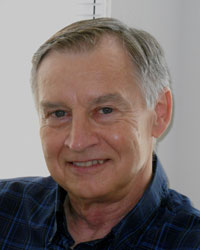Texas A&M's Johnson wins the ASBMB–Lipmann lectureship
, a distinguished professor at the Texas A&M Health Science Center’s College of Medicine, has been chosen to give the at the ��Ʒ����һ��������ɫ annual meeting in April in Washington, D.C.
 |
|
“I am very honored to receive this award, and I thank ASBMB and the students, postdocs and collaborators who made this possible. Since Dr. Lipmann discovered EF-Tu, the focus of much of my early research, being named the Lipmann lecturer has extra significance for me.” |
“Art revolutionized our understanding of how complex protein machines operate,” says Vytas A. Bankaitis of the University of North Carolina at Chapel Hill School of Medicine, who nominated Johnson for the award. “The level of international acclaim and respect afforded to him by the larger scientific community is richly deserved on the basis of his outstanding research accomplishments over a distinguished career.”
The lectureship, which is awarded every two years, recognizes investigators who make conceptual advances in biochemistry, bioenergetics and molecular biology. Johnson was named the winner for pioneering the use of site-specific incorporation of non-natural amino acids into polypeptides and biophysical fluorescence approaches toward detailed elucidation of the dynamics and functional mechanisms of complex molecular machines.
After completing his undergraduate studies in chemistry at the California Institute of Technology in the 1960s, Johnson taught and coached football in Boston. He then went on to earn his doctorate in chemistry at the University of Oregon in 1973 and conduct postdoctoral work at Columbia University.
Thereafter, he joined the faculties of the University of Oklahoma in 1977 and Texas A&M University in 1994. Today, he holds the E. L. Wehner-Welch Foundation chair in chemistry at the College of Medicine.
To this day, Bankaitis says, the approaches Johnson pioneered remain the most powerful, yet accessible, tools to study the dynamics of complex biochemical systems. Additionally, he says, Johnson always has been “a gentleman scientist.”
“These days, it is all too common for researchers to be driven to prolific productivity by the motive of enterprise – the desire to be recognized, to win awards, to establish themselves personally,” he emphasizes. “While all of these motives are legitimate in proper measure, what is often lost is the proportion between mentorship and enterprise, between noble scientific pursuit and competition for the more material rewards, between a genuine desire to foster the independent careers of young researchers and exploitation of those talents.
“Art Johnson has always been a consummate professional – a great scientist, an effective and engaged mentor, a dedicated and effective teacher, and an outstanding citizen with respect to professional service.”
Enjoy reading ASBMB Today?
Become a member to receive the print edition four times a year and the digital edition monthly.
Learn moreGet the latest from ASBMB Today
Enter your email address, and we’ll send you a weekly email with recent articles, interviews and more.
Latest in People
People highlights or most popular articles

Understanding the roles of extracellular matrix and vesicles in valvular disease
MOSAIC scholar Cassandra Clift uses mass spectrometry and multiomics to study cardiovascular calcification and collagen dysregulation, bridging her background in bioengineering and biology to investigate extracellular vesicles and heart disease.

Learning, leading and lifting others
Tigist Tamir’s journey from aspiring astronaut in Ethiopia to cancer researcher at the University of North Carolina highlights the power of mentorship, persistence and curiosity in shaping a scientific career focused on discovery and equity.

Biochemists and molecular biologists sweep major 2025 honors
Recent Nobel, MacArthur and Kimberly Prize honorees highlight the power of biochemistry and molecular biology to drive discovery, including immune tolerance, vaccine design and metabolic disease, and to advance medicine and improve human health.

Subramanian receives electron microscopy honor
He delivered remarks at the International Conference on Electron Microscopy in Bangalore, India.

Bioart for fall: From order to disorder
The cover of the fall issue of ASBMB Today was created by ASBMB member, Soutick Saha, a bioinformatics developer at Wolfram Alpha LLC.

Doudna wins Priestley Medal
She will receive a $20,000 research grant and will formally accept the honor at the ACS Spring 2026 conference.

